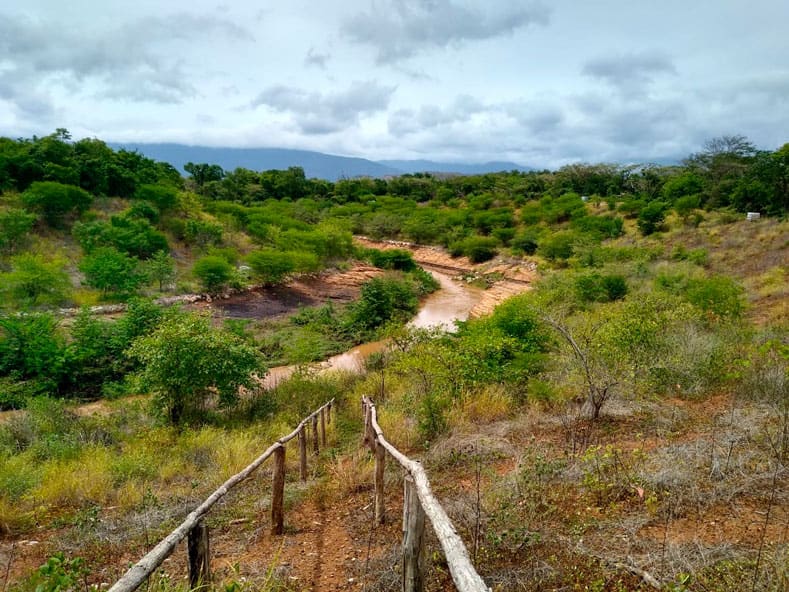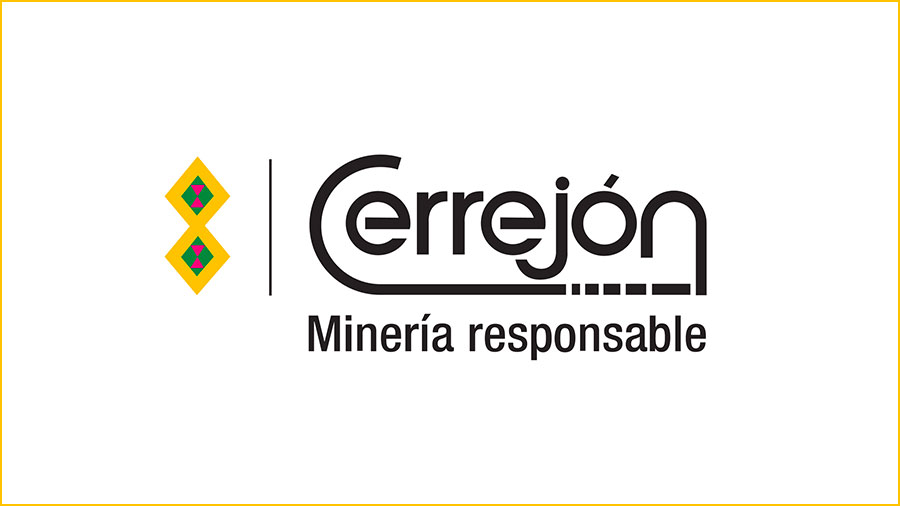E-Newsletter october 2019

Prior consultation process begins with Tigre Pozo and El Rocío communities de consulta previa con las comunidades de Tigre Pozo y El Rocío
On July 18 and 19, prior consultation began with the communities of El Rocío and Tigre Pozo to identify, and compensate for, possible effects caused by partial diversion of the Arroyo Bruno (Bruno Creek). The initial stages have already moved forward to define the methodology to follow, and meetings will begin this month to identify impacts and design management measures. Meanwhile, the company and communities will coordinate meetings to move forward together in constructing an impact matrix.
These two consultations are taking place in fulfilment of the 2016 sentence from the Council of State, which requested a prior consultation process be carried out with the community of La Horqueta 2 and to verify if the criteria used by this court to define the need for a consultation with this community was also applicable to other communities (inter comunis effect). These two communities were identified by the Ministry of the Interior.
Dating back to 2005, the project to partially divert the Arroyo Bruno was taken on as an impact management measure to avoid possible effects from mining activities in the La Puente pit on this body of water.
In addition to having the necessary permits, in 2014 the company carried out a prior consultation with the community of Campo Herrera, initially identified by the Ministry of the Interior as the only community affected by the work to be done as they are located downstream from the project. In this prior consultation process, agreements were reached on management measures for the project and also on projects for economic, cultural and environmental strengthening, which are currently being implemented and monitored.
For its part, consultation with the community of La Horqueta 2 took place for more than 27 months. During this time, development moved forward in all areas including pre-consultation, opening steps, identification of impacts and formulation of measures for management and execution. In spite of efforts made by both parties, it was not possible to reach an agreement on management measures relating to socio-economic and cultural aspects, which led the Prior Consultation Board of the Ministry of the Interior to close the consultation without agreements on May 15, 2019.
In the framework of a compliance verification procedure that is currently before the court of first instance, the judge convened a hearing that took place on August 22, 2019, in which a procedural agreement was reached among all the participants to use the month of September to reach agreements and, in October, have a developmental phase for a new meeting to execute the agreements reached.
Cerrejón respects the right of the indigenous communities to consultation and considers it essential to have their participation when it comes to making decisions. For this reason, the company maintains an ongoing relationship and informed conversations with their representatives. Consultation is a recourse that ethnic groups have to protect their cultural, social and economic integrity and to guarantee their right to participation when it comes to their territories being affected. The company has carried out these processes when the responsible authorities, or legal decisions, have deemed them to be necessary. Cerrejón remains committed and willing to have an informed, constructive and respectful dialogue with its stakeholders, and reaffirms its intention to work towards common objectives, considering this to be the best path to reaching agreements between the parties.
Improvements to homes in resettlements: Working together

In accordance with objectives defined in recognized social standards, resettlement processes are understood as a mechanism of last resort and are carried out to avoid potential impacts caused by the mining operation that could significantly affect the communities. In addition, they are seen as an opportunity to improve the living conditions of all the families.
In the case of the five resettlements done by Cerrejón (Roche, Patilla, Chancleta, Las Casitas and Tamaquito II), the agreed compensation packages focused on replacing assets (properties and improvements), compensating for the impacts caused and, at the same time, providing family and community infrastructure as well as establishment of programs to make the transition to the new villages easier.
Key elements of this process were the choice of location for the new village, the design of the homes and their distribution in the territory, all done with full involvement of the families. Although the houses offer the conditions desired by the communities in terms of size, distribution, access to public services, style and materials, one of the challenges we have faced has been the need to perform repairs, of differing degrees of complexity, to a number of homes. These repairs have been necessary due to various defects that became apparent in the construction of the homes, as well as due to normal wear and tear. This construction work can be classified into maintenance, which relates to minor damage, and repairs, which are those of greater importance.
After offering several alternatives to the communities to deal with the necessary repairs and maintenance, we agreed that the best option to carry out the work was through community organization and empowerment, allowing families to manage the improvement processes. This is how two infrastructure agreements were established with two community action boards, as well as two agreements with associated community businesses.
The communities are free to stay with the community entity they feel is most suitable, resulting in work that is a collective effort among the five resettled communities. Requests from the community are channelled through these businesses, and Cerrejón works with them to contract the work needed to take preventive actions and to improve the homes in the resettlement. The communities are free to stay with the community entity they feel is most suitable, resulting in work that is a collective effort among the five resettled communities.
To date, 65 homes having flaws ranging from minor maintenance to major repairs have been worked on, and nine more are currently being repaired. Homes in Roche, Patilla, Chancleta and Tamaquito II will be subject to both types of work, while the homes in Las Casitas will only be subject to maintenance – should this be determined to be necessary – given the newness of their infrastructure (only five years have passed since the first family moved to the new village).
How this work advances will depend on the agreements reached between the company and the communities, always based on a constructive and respectful dialogue between the parties. We recognize that the processes involved in resettlement are hugely challenging, but they have also meant a chance for both Cerrejón and the communities to learn important lessons, allowing us to join efforts and interests to increase well-being and improve their quality of life.
Businesses and Human Rights: considering due diligence as inseparable from responsible management
By: Guillermo Fonseca, President of Cerrejón
It is increasingly clear, necessary and valuable that the business sector knows profoundly the context in which it operates and understands its dynamics, conflicts and challenges. This type of understanding is necessary to operate in an environment such as the one in Colombia, where companies like us who are present in the territories have, in addition to carrying out our economic activity, an obligation to create social value and improve living conditions. As such, we have relationships with diverse communities that bring together, as is the case of Cerrejón in La Guajira, urban and rural populations, farmers, and indigenous and Afro-descendant groups. Many of these people live in vulnerable conditions with low access to health, education, employment and basic services, a situation compounded by the presence of local institutions facing enormous challenges in regard to governmental operations, resource management and capacity development.
Due to this mission to create not only economic but also social value, companies like ours have begun to see ourselves as one more actor in the territory in which we operate and to take responsibility for the duties and responsibilities that this entails. This role encompasses responsible business management, respecting the environment, recognizing the rights of communities and providing our workers with the safest working conditions possible, all in order to create business value.
Operating responsibly translates into working under two large premises. The first is to advance economic business activity in alignment with high social and environmental standards, to identify and lessen impacts and compensate for them when they cannot be prevented. At the same time, this translates into setting up quality assurance procedures that allow corporate performance to be monitored and implementing actions for ongoing improvement. Having these quality assurance and internal audit systems in place to apply the standards adopted, and tending towards a proactive, respectful and non-transactional relationship, are the considerations that today stand as pillars of our due diligence in human rights. Along with this, the second premise is to use voluntary strategic projects to develop social investment that contributes to the sustainability of the territory and promotes the well-being of the local population.
Human rights are the fundamental purpose for these two important premises. On the one hand, timely identification and management of impacts and their quick resolution when they occur is, under leading recognized international standards, the equivalent of respect for human rights. On the other hand, the purpose of implementing social investment is to contribute to the realization of basic and essential rights for all people, such as access to health, education, employment, and culture, among others.
The United Nations Guiding Principles on Business and Human Rights, the principal international standard on this subject, establish the responsibilities of States and companies in this area.
The State must protect and guarantee human rights, while companies must respect them in our areas of operation.
These same guidelines establish that in order to solidify respect for human rights, companies must take on this responsibility in a structured and systematic manner, incorporate it into the day-to-day operation and set in motion a process of due diligence. This involves: having a policy that makes a public commitment to this matter; identifying risks and impacts that may violate the rights of people, including workers, and the environment; knowing what are the real, or perceived, impacts that exist among the communities to manage them correctly; and identifying and defining the measures that prevent risks from happening.
No less important is to have a corporate complaints mechanism that allows anyone who feels affected by the operation to have a channel where they can express their complaints. This must be available in a way that is reasonable, legitimate, transparent and culturally appropriate, and should provide feedback for us to manage risks and impacts as well as to improve the quality of the relationship with our neighbours. Finally, as I mentioned earlier, this process of internal management requires monitoring and quality assurance of the measures that have been defined and implemented under a system of ongoing improvement that allows the necessary adjustments to be made.
The experience of initiating due diligence procedures in human rights has been a learning process for corporations, which has led companies like Cerrejón to understand that what is stated in its policies and public commitments constitute a bulwark for the relationship with communities, and that the identification, prevention and lessening of impacts passes through complex operational processes. Also, these processes have allowed us to understand that often damages only become visible through dialogue with the communities; that to repair a determined impact is part of a process of responsible management with the territory; and that ongoing improvement in performance on human rights forms part of the business, just like any business management process.
Understanding the context and acting responsibly within it is how Cerrejón manages the creation of business value. Respect for human rights constitutes a fundamental premise to create this value. Investors, clients, governments, civil society and communities see respect for human rights as a highly-valued competitive variable in a world in which social mobilization, responsible consumption and the environment are matters that increasingly determine the economic and business dynamic. And, of course, for companies such as Cerrejón, from this perspective due diligence in human rights is necessary for the context, for sustainability and for the trust third parties have placed in our company, as well as to promote the enjoyment of rights by our collaborators and neighbouring communities.
Weaving opportunities for la guajira and its communities

At Cerrejón, in addition to being committed to identifying, preventing and lessening the impacts associated with the operation – and compensating for them when necessary – we voluntarily establish and invest in projects aimed at improving the quality of life and contributing to regional development. We do all this through an ongoing and meaningful relationship with the communities neighbouring the operation. These projects are developed through the Cerrejón Foundation, which brings together all the vast experience of a team of people who are committed to development in La Guajira.
One of the lines of action of our social investment is to strengthen capacities of local entities and the communities. To do this, for more than 14 years we have dedicated our efforts to strengthening artisanal activity, one of the principle vocations of the indigenous communities. La Guajira is one of the departments in Colombia with the largest indigenous population (44%, mainly Wayuu) and one of the iconic activities, both culturally as well as economically, is the creation of artisanal products based on the ancestral knowledge of these communities. Contrary to other economic activities that depend on the amount of water available during the year, artisanal activity provides a clear opportunity as it can be developed throughout the entire year.
Through the Cerrejón Foundation, the goal is to position traditional art as an economic course of action that can contribute to improving the income of the indigenous communities.
Over the past 10 years, the program has backed a partnership of 96 artisanal groups that brings together 3,252 artisans from the Wayuu and Wiwa ethnic groups and has received support from important public and private partners such as the Colombian Institute of Family Well-being, the Creata Foundation and the National Learning Service (Sena). In January of this year, the Cerrejón Foundation received from Artesanías de Colombia the 2018 Artisanal Medal Award in the category of development in recognition of the work that has been developed in this area.
A statement from Mabel Vega, a master craftswoman of Wiwa ethnicity:“For me, it has been very important to convey this knowledge to different generations; this custom was being lost and was no longer seen as a livelihood. We have now managed to reclaim its importance, which identifies us ethnically and lets us meet our needs”.
Under this program, sponsorship is provided for the artisans to participate in different fairs throughout the country. The most recent was attendance at the 2019 Expoartesano fair in Medellin. The results of this gathering were significant with respect to the previous year, showing an 85% increase in sales, which demonstrates great strides forward in the production process and sales strategy of these artisanal groups.
Tania González, an artisan from the community of Riritana in Maicao, commented: “This has been a process of training and learning along with the Foundation, which has allowed us to refine our weaving techniques and manufacturing. The experience we are having here will be duplicated in our communities to strengthen skills and continue to work for the benefit of our community”.
According to Artesanías de Colombia, an institution attached to the Ministry of Culture, 83.8% of the artisans who participate in this program receive a monthly income that is nearly $250US, and 86.6% of them devote their time exclusively to this trade. That is, they depend directly on the sales of their crafts.
With the Artisanal Strengthening Program, the Cerrejón Foundation aims to contribute to strengthening the sector and to the establishment of good practices in this area. This progress takes place through the training of human capital and consolidation of partnerships for improvement of their productive and commercial chain. In the end, this translates into creating income for the communities and, equally as important, the preservation of traditional practices and customs.

On July 18 and 19, prior consultation began with the communities of El Rocío and Tigre Pozo to identify, and compensate for, possible effects caused by partial diversion of the Arroyo Bruno (Bruno Creek). The initial stages have already moved forward to define the methodology to follow, and meetings will begin this month to identify impacts and design management measures. Meanwhile, the company and communities will coordinate meetings to move forward together in constructing an impact matrix.
E-Newsletter october 2019
